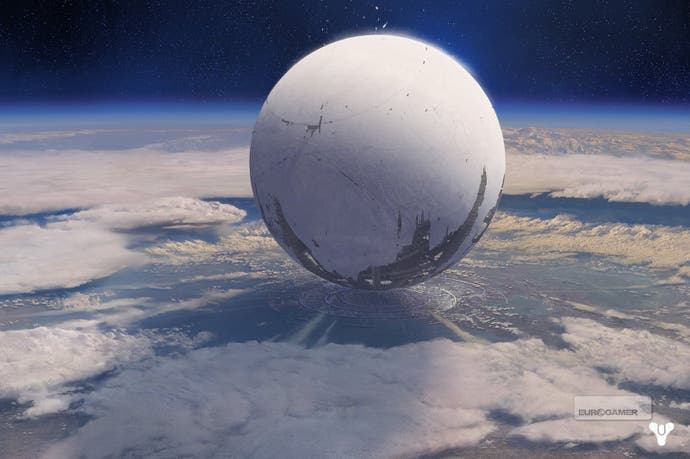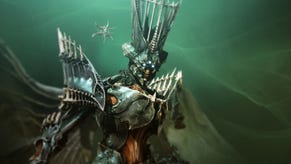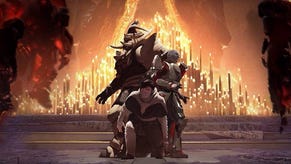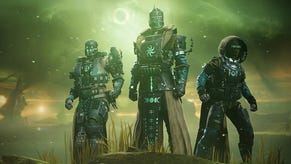Destiny review
Fate out of ten.
For all the countless millions spent on publicity for Bungie's "shared world shooter" Destiny - for all the phrases like "shared world shooter" it has contributed to the video game world's industrious output of meaningless buzzwords - the developer and its publisher Activision have repeatedly failed to communicate exactly what this game is. This is hardly because it is such a novel concept that it has to be experienced to be understood. It's not. It's because they have been reluctant to use the elevator pitch that surely convinced Activision's top brass to open their chequebooks in the first place: "What if World of Warcraft looked and played like Halo?"
We assumed they were just being coy, precious or wary - perhaps all three - but they also had half a point. For all the many inspirations Destiny takes from WOW and its breed of massively multiplayer games, it is not your traditional MMO. The networking technology is different, the multiplayer dynamics are different, the scale and structure of the content are different. It is a more intense, more compact style of game, but also a more fractured one. Although you'll often see other players around you - even when you're soloing a story mission - it struggles to create the immersive world and sense of community that the best MMOs inspire.
Some have been quick to dismiss it as a kitchen-sink hybrid: a bunch of derivative, focus-tested features slapped together without thought for how well they coalesce. That's understandable, but unfair. The deeper you penetrate into Destiny's systems, the more you'll appreciate how subtle, finely crafted and distinct this hybrid is. The ingredients are (almost) all familiar, but the recipe is quite unusual.
And yet we come back to that elevator pitch, because while it might be crude, it's also useful. "What if World of Warcraft looked and played like Halo?" If you find that an attractive prospect - spoiler: I do - then step right up. If you haven't played first-person shooters for years because you find their campaigns disposable and their competitive multiplayer intimidating, Destiny presents a viable and engrossing third way. If, however, you have come to this game expecting to be taken on an epic science-fiction ride by the masters of space opera who made Halo - well, you're liable to leave disappointed before this frustratingly detached game has condescended to reveal its true treasures.

In Destiny, players assume the role of Guardians, blessed soldiers of a distant future, fighting for mankind. A giant alien orb called the Traveller visited Earth and brought enlightenment to man, but then something bad happened and several alien races invaded the solar system intent on humanity's doom. Or something like that. If I'm vague it's because Bungie has made a dismally poor fist of providing meaningful context for the action or, for that matter, meaningful action for the context (and because I don't wish to spend time browsing unlockable Grimoire cards in a companion app to make sense of it all). Bungie's writers show a talent for sonorous science-fantasy lingo - the House of Exiles, Dead Orbit, Psion Flayers, the Ishtar Sink - but no talent at all for imbuing it with meaning or relevance. As for humanity or wit, forget it.
A preference for convoluted backstory over strong, simple narratives is a common disease of contemporary pop culture. In Destiny it reaches epidemic proportions. Lest we forget, Bungie's last game was 2010's Halo: Reach, which made the mistake of assuming people cared more about the portentous and sentimental lore of the Halo universe than the high adventures of an indomitable space marine and the computer who loved him. Sure, it's hard to tell that kind of story in a world teeming with hundreds of customised player avatars - but did the world have to be so dour, the situations so hard to grasp? The game's campaign - told across 20 meaty, sprawling missions, all playable solo or in co-op - amounts to a disjointed sequence of objectives garlanded with gobbledygook. This is all intoned with undue reverence by a luxurious voice cast that includes Bill Nighy and Peter Dinklage (unfairly criticised for his flat delivery as your Ghost companion, considering the absolute howlers he's asked to read).
A good job, then, that Bungie's artists are on the form of their lives. In the glowing, airbrushed tones of a 1970s book cover, they take us from Earth to the Moon, Venus and Mars, painting a stunning picture of a future so far removed it looks ancient. With remarkable facility, they blend hard sci-fi with dark medieval fantasy, opulent religious overtones with the familiar textures of recent history: monochrome moon dust, arid desert war, the rusting, overgrown graveyard of Soviet ambition. Destiny's art is as eloquent, resonant and exciting as its script and plotting are not. Only the Guardians themselves disappoint in their looks; although you can pick from three races and three classes, their silhouettes are too similar, their weapons and armour sets too restrained to allow for the kind of showboating oneupmanship that players crave.
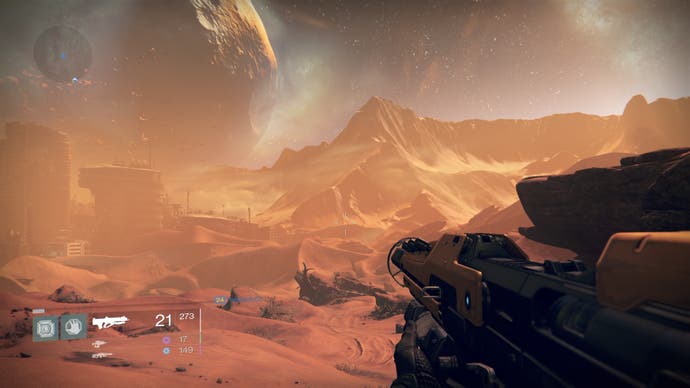
The three classes are Hunter, an agile, deadshot scout type; Warlock, a sort of futuristic battle mage with strong recovery skills; and the tough, defensive Titan. These aren't the cleanly defined classes of role-playing tradition, though - or even of tactical shooter tradition. They have strong flavours, each having their own style of grenade and melee attacks and show-stopping Super abilities divided across two subclasses. But they're all hardy and adaptable, and your play style will be just as influenced by which guns you choose to wield in your three weapon slots - primary, special and heavy. You won't need to worry about group composition until very late in the game, if ever, but the classes are tasty enough to consider levelling up another if you're enjoying yourself.
If you're wondering why there isn't more variation in the classes - or, for that matter, in the guns, which seem limited in scope compared to the wild excesses of Borderlands' armoury - the answer lies in the combat. It is Halo's combat, almost note for note: the slow, arcing jump, the lethal smack of the melee attack, the see-saw rhythm imposed by the recharging shield, the glorious heft and personality of the weapons, the exquisite balance, the sense of physical consequence, the moonwalking, flanking enemies. Disregarding the fact that Halo continues to be made by other people, Bungie has claimed this creation as its own - and its dynamics are just as brilliant now as they were in 2001. It doesn't do cheap and it doesn't do stagey, and even the slightest encounter has a life of its own. Moment to moment, it's the best shooter gameplay in the business, bar none.
If the classes had differed too widely from each other, or if each gun family hadn't been tuned with expert care, then flaws might have been introduced to this immaculate core. Thankfully, Bungie knew better. This softly-softly approach is, I suspect, also why Destiny doesn't immediately grab you as a role-playing game.
Your Guardian earns experience and levels up as you play. At first, the levelling seems shallow and the loot seems unexciting. Although a few stats increase and you unlock new perks and abilities over time, there isn't the sense that you can go grinding, over-level yourself and annihilate your foes; you rarely pick up a new weapon or armour piece that seems to supercharge your character as in, say, Diablo. At first I assumed that this was Bungie's inexperience in RPGs showing through, or worse, that the whole system was just for show. Not so.
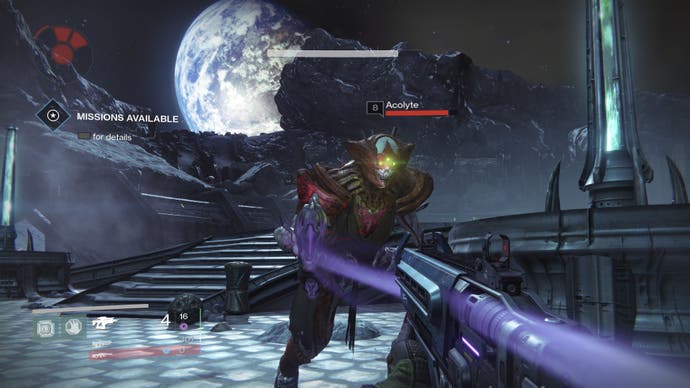
Figuring that it would need to devise something new to keep its honed action gameplay from being bent out of shape by the onslaught of numbers, Bungie has come up with an ingenious hybrid levelling system, albeit a rather unintuitive and poorly explained one. The route to the "soft" level cap of 20 is relatively shallow and short (15 hours or so) precisely because stats only make so much difference in Destiny. This has the side benefit of keeping players of different levels within touching distance of playing with each other, and making some levelling of the playing field possible in competitive multiplayer.
There's more, though. Beside your overall character level, you have multiple micro-progressions running in parallel. Individual items of equipment earn XP, unlocking upgrades and perks; loot is exciting for its potential rather than its impact - which, in a way, makes it more exciting still. XP also goes into whichever subclass you have equipped, unlocking its skill tree, and just maxing out one of the two subclasses will take you until long after level 20. Beyond level 20, too, lies the Light levelling system, which discards XP and ties progression to equipping better gear and upgrading the gear you have. It's the endgame gear grind of online RPG tradition, but Light gives you a very useful at-a-glance way to measure your progress through it. MMO and RPG developers would do well to copy it.
If all this sounds confusing, it boils down to this: in place of the raw, exponential numerical escalation you expect from an RPG, what Destiny proposes instead - through a complex web of perks, gear affixes and stats - is increased efficiency. Shorter cooldowns on your powers; faster melee and reload speeds; greater ammo capacity. Your character doesn't get stronger so much as faster, more frictionless. As progression systems go, it's a superb fit for such a skill-based game - as evidenced in competitive multiplayer, where the base attack and defence stats are levelled out and a skilful low-level player still has a chance to beat a high-level one, even with all the advantages they've unlocked.
Bungie has said that Destiny doesn't really get going until you get to level 20, and I agree - though, as you trudge through the campaign's saggy middle (particularly some dreary episodes on the Moon), you'd be justified in wishing the developer had decided to start the game a little earlier. But what will you be getting up to once you're clear of it?
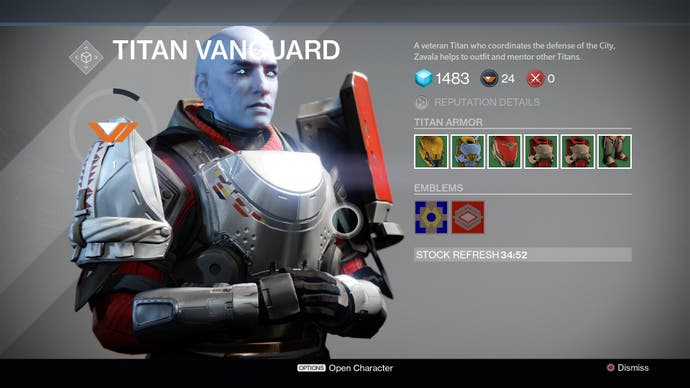
There's the Crucible, Destiny's addictive if rather by-the-numbers competitive mode. It doles out plenty of XP and good gear, so it's rewarding to spend time in - it's even a viable alternative levelling path - but it's not that welcoming to newcomers. Situated between classic Halo and the pacier style popularised by Call of Duty, it's focused on very fast-moving encounters on tight maps, with vehicle combat taking a back seat. Guardians have more mobility and kill more quickly than Spartans, and the resulting match-ups can feel chaotic. But some of the supposedly unbalanced elements - the destructive Super abilities, the heavy ammo spawns that act like Halo's power weapons - are exactly what give daring lower-level players a chance, not to mention being great fun to pull off. The Crucible never reaches the big team battle heights of Halo at its best and needs fleshing out - particularly with options like custom playlists, private games and map voting - but it's a solid basis of violent fun for Bungie to build on.
For casual downtime, there's Patrol - a free-roaming mode available on each planet, with an endless supply of very basic micro-missions to do (kill stuff, collect things, scan doohickeys). Patrol exposes the fact that Destiny isn't really an open-world game, or even that big. Its maps are more akin to giant shooter levels connected by narrow passageways than a truly expansive open world, so pinging around them can be awkward. The corollary is that they're meticulously built, with plenty of enticing nooks and thoughtfully placed cover to support that thrilling combat.
Patrol isn't an exciting mode, but it's a nice palate-cleanser and it dovetails well with the Bounty meta-challenges, which reward enormous dollops of XP. It's also the best place to experience the brilliant and all-too-rare Public Events. These, a straight lift from MMOs like Warhammer Online and Guild Wars 2, suddenly drop a concentration of tougher enemies into the middle of the game map, encouraging you to team up with passing strangers to defeat them against the clock.
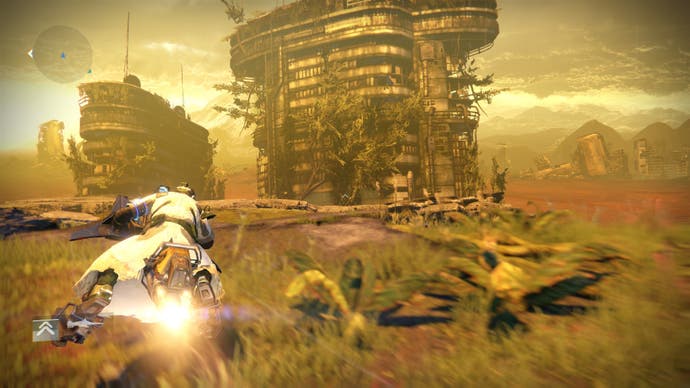
You can also replay story missions at high level with Heroic modifiers - equivalent to tackling a Halo level on Legendary with Skulls equipped. And then there are Destiny's coup de grâce: Strikes. These three-player missions are effectively the game's dungeons, and they are co-op gaming of the highest order. Brutal combat sorties capped by punishing, attritional boss fights, these thoroughbred challenges require a degree of teamwork and determination even in their low-level incarnations. In the boosted versions available in randomised playlists at level 18 and above - especially the big step up at level 22 - they are a serious business indeed. The six-player, level 26 Raid has only just been added. It's to be hoped that future boss encounters can vary a little from the 'giant bullet sponge plus waves of minions' model, but it would also be untrue to suggest that vanquishing these isn't thrilling or cathartic. Strikes are the most intense and gratifying co-op experience I've had since WOW's golden days. We're back to that elevator pitch; mission accomplished.
This, for me, is Destiny's raison d'être, its resounding justification. It's a systematically refined game, with superlative combat and intriguing progression that plays the long game. It's beautiful. It's a slow burner, perhaps dangerously so for the skittish console audience, although the prevailing winds in gaming - where social, persistent metagaming is king - are on its side. It's a sound competitive shooter that doesn't particularly stand out in a sea of strong competition. It's inscrutable and cold and heavy-handed, saddled with pompous lore, inept storytelling and undercooked mission design. It won't necessarily satisfy fans of Halo's rollercoaster campaigns. It could really use a sense of humour. And it initially appears to do nothing new beyond require an internet connection.
But in the white heat of the Strike playlists - or in Heroic mission runs with a friend, or in the unheralded arrival of a public event whilst tooling around in Patrol - Destiny blazes a clear trail through the middle of the desolate no man's land that, for years now, has segregated the bombastic emptiness of shooter campaigns from the frenetic slaughter of multiplayer. And it does so with a poise and depth that its few peers - games like the charming but scrappy Borderlands and Far Cry - cannot match; a poise and depth that will keep people playing it for years.
Additional reviewing of Crucible multiplayer by Wesley Yin-Poole.
